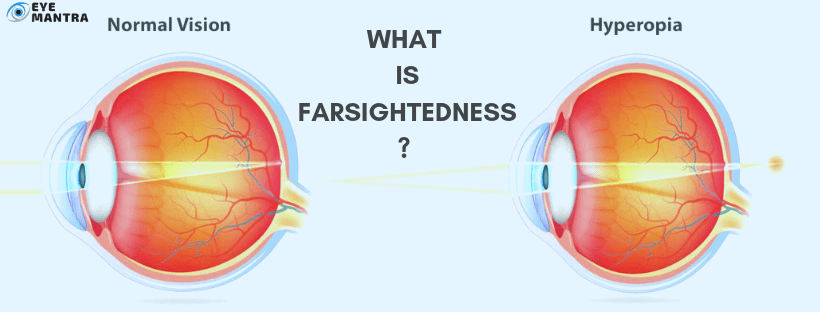Hyperopia, is a type of refractive error where the affected person’s eyes can focus on objects that are far better, than the ones nearby.
Contents
WHAT CAUSES HYPEROPIA?
The cornea ( a clear , dome-shaped front surface of the eye) and the Lens ( a clear structure in the eye) helps the eye to focus on images.
If the eye is free of refractive errors, then these focusing elements have a smooth curvature just like the curvature of a marble.
The cornea and the lens refract the light rays and focus it on the retina which is at the back of the eye.
Hyperopia occurs when the eyeball is shorter than normal or if the cornea is less curved. This uneveness makes the light rays to focus on further behind the retina, thus causing a refractive error.
SYMPTOMS OF HYPEROPIA
During Hyperopia you may have symptoms like:
- Trouble focusing on nearby objects
- Headaches
- Blurry vision
- Eye strain
- Fatigue
DIAGNOSIS FOR HYPEROPIA
Hyperopia can be diagnosed by an eye exam. Simple eye exams which include refraction assessment and other tests using the Retinoscope and Phoropter are used to detect hyperopia.
TREATMENT FOR HYPEROPIA
To treat hyperopia we have to help the light rays focus on the retina by using corrective lenses or refractive surgery.
Prescription lenses
For Hyperopia treatment isn’t necessary because the lenses inside the eyes are flexible enough to compensate for the condition. Depending on the degree of farsightedness,prescription glasses are given to improve the near vision.
Wearing prescription lenses treats hyperopia by Increasing the decreased curvature of your cornea or the smaller size (length) of your eye. Types of prescription lenses include:
- This is a simple, safe way to sharpen vision caused by Hyperopia. There are a variety of eyeglasses like bifocals to choose from.
- Contact lenses. Contact lenses are worn right on the eyes. Contact lenses are available in different materials and designs.
Refractive surgery
Although most refractive surgical procedures are used to treat nearsightedness, they can also be used for mild to moderate farsightedness. These surgical treatments correct “Hyperopia” by reshaping the curvature of your cornea.
Refractive surgery methods include:
- Laser-assisted keratomileusis (LASIK).With this procedure, your ophthalmologist makes a thin flap into your cornea. Then they uses a laser to adjust the curves of the cornea that corrects the Hyeropia.
- Laser-assisted subepithelial keratectomy (LASIK).The ophthalmologist creates an ultra-thin flap only in the cornea’s epithelium. Then he uses a laser to reshape the cornea’s outer layers, changing it’s curvature, and then he replaces the epithelium.
- Photorefractive keratectomy (PRK).This procedure is similar to LASIK, except the ophthalmologist completely removes the epithelium, then uses the laser to reshape the cornea. The epithelium is not replaced, It is supposed to grow back naturally fitting to the cornea’s new shape.
COMPLICATIONS WITH HYPEROPIA
Hyperopia can lead to several problems, such as:
- Crossed eyes.Some children with hyperopia may develop crossed eyes. Specially designed eyeglasses that correct for part or all of the Hyperopia.
- Reduced quality of life.With uncorrected Hyperopia, you might not be able to perform a task as well as you wish. And your refractive error may reduce your enjoyment of day-to-day activities.
- Uncorrected hyperopia may make you squint or strain your eyes to maintain focus. This can lead to eyestrain and headaches.
- Impaired safety.Your own safety and that of others may be jeopardized if you have an uncorrected vision problem. This could be especially serious if you are driving a car or operating heavy equipment.
- Financial burden.The cost of corrective lenses, eye exams and medical treatments can add up, especially with a chronic condition such as Hyperopia.
PREVENTION FROM HYPEROPIA
You can’t prevent Hyperopia, but you can help protect your eyes and your vision by following these tips:
- Have your eyes checked.You should get regular eye exams. If you have any vision problems it will get treated on time.
- Control chronic health conditions.Certain Diseases, such as diabetes and high blood pressure, can affect your vision if not treated.
- Protect your eyes from the sun.Wear sunglasses that block ultraviolet (UV) radiation from the sun.
- Prevent eye injuries.You should try to wear protective eye wear when using products with toxic fumes for examples spray paints.
- Eat healthy foods.You should try to eat leafy greens, other vegetables and fruits. Accoridng to some studies eating diet fish like tuna and salmon benefit your eyes too.
- Don’t smoke.Smoking has a bad effect on your eyes as well.
- Use the right corrective lenses.The right lenses optimize your vision. You should take regular exams to ensure that your prescription glasses are correct.
- Use good lighting.Use good lighting for the place you work to reduce eyestrain.
- Reduce eyestrain.To reduce eyestrain you should use the 20-20-20 rule. It states that you should look away from your desk, every 20 minutes at something 20 feet away for 20 seconds.
CONCLUSION
Hyperopia is a type of refractive error which is common and can be treated with corrective lenses.
EyeMantra eye care centre in Delhi has experienced and well-trained ophthalmologists, who will take proper eye exams to detect hyperopia first and then provide correct treatment for it.
To book an appointment contact: Ph: +91-9711115191
Also Read:
Phaco Surgery | Types – Regular or Micro | IOLs & Equipments
Diet & Nutrition for healthy eyes
Eye Diseases: Complete List, Causes, Symptoms and Treatment

